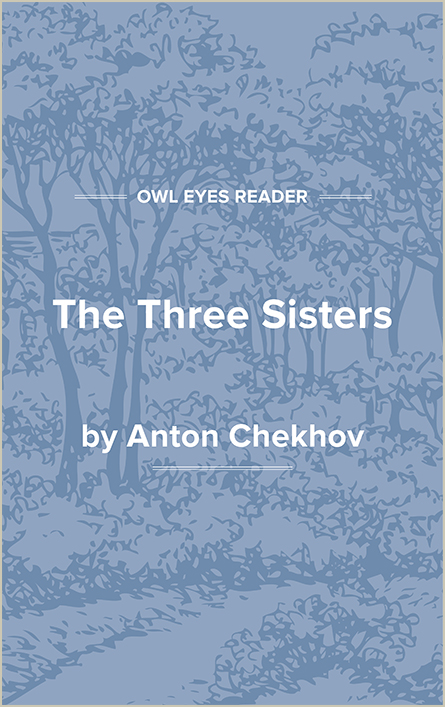Study Guide
Summary
On Irina’s name-day, her friends and family call to wish her happiness. It is exactly one year since the death of her father, who was sent from Moscow eleven years before to this provincial town at the head of a brigade. Irina and her sister Olga long to go back to Moscow, and Masha would like to go, too, except that she married Kuligin, whom she once thought the cleverest of men. They all pin their hopes on their brother Andrey now, who is studying to become a professor.
An old army doctor, Tchebutykin, brings Irina a samovar because he loved her mother. Masha’s husband gives her a copy of the history of the high school in which he teaches; he says he wrote it when he had nothing better to do. When Irina tells him that he already gave her a copy for Easter, he merrily hands it over to one of the army men who is calling. Tusenbach and Solyony quarrel half-heartedly because Tusenbach and Irina decided that what they need for happiness is work. Tusenbach never did anything but go to cadet school, and Irina’s father prepared his children only in languages. Both have a desire to labor hard at something.
When Vershinin, the new battery commander, comes to call, he reminds the girls that he lived on the same street with them in Moscow. He praises their town, but they say they would rather go to Moscow. They believe that they are oppressed with an education that is useless in a dull provincial town. Vershinin thinks that for every intelligent person then living, there will be many more later on, and that the whole earth will be unimaginably beautiful two or three hundred years hence. He thinks it might be interesting to relive one’s life to see if one can improve on the first version.
Natasha comes in while they are still sitting at the dinner table. Olga criticizes her dress, and the men begin to tease her about an engagement. Andrey, who cannot stand having her teased, follows her out of the room and begs her to marry him. She accepts.
After their marriage, Andrey loses any ambition he ever had to become a professor; he spends much of his time gambling, trying to forget how ill-bred, rude, and selfish Natasha is. Irina, meanwhile, takes a job in the telegraph office, and Olga teaches in the high school. Tired when they come home at night, they let Natasha run the house as she pleases, even to moving Irina out of her own bedroom so that Natasha and Andrey’s baby can have it.
Vershinin falls in love with Masha, though he feels bound to his neurotic wife because of his two daughters. Kuligin realizes what is going on but cheerfully hopes Masha still loves him. Tusenbach, afraid that life will always be difficult, decides to give up his commission and seek happiness in a workingman’s life. Vershinin is convinced that, by living, working, and struggling, people can create a better life. Because his wife periodically tries to commit suicide, he looks for happiness not for himself but for his descendants.
Andrey asks Tchebutykin to prescribe for his shortness of breath, but the old doctor swears he forgot all the medical knowledge he ever knew. Solyony falls in love with Irina, who will have nothing to do with him. He declares that he will have no happy rivals.
One night, all gather to have a party with mummers who are to come in. Natasha decides that the baby is not well and calls off the party at the last minute. Then Protopopov, the chairman of the rural board, comes by with his carriage to take Natasha riding while Andrey sits reading in his room.
A short time later, fire destroys part of the town. Olga gives most of her clothes to those whose homes were burned and, after the fire, invites the army people to sleep at the house. Natasha berates Olga for letting her old servant sit in her presence and finally suggests that Olga herself move out of the house. The old doctor becomes drunk because he prescribed incorrectly for a woman who died. After the fire, people want him to help them, but he cannot. In disgust, he picks up a clock...
(The entire page is 1,158 words.)
Owl Eyes subscribers get unlimited access to our expert annotations, analyses, and study guides on your favorite texts. Master the classics for less than $5/month!

